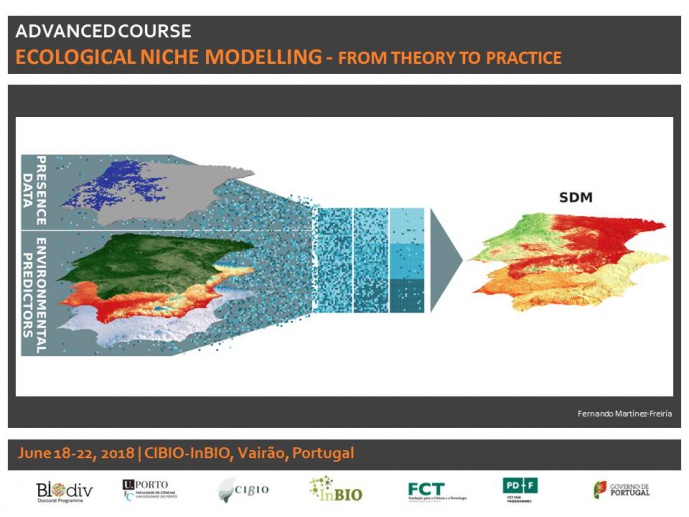ADVANCED COURSE: ECOLOGICAL NICHE MODELLING FROM THEORY TO PRACTICE


Ecological niche models (ENM) or species distribution models (SDM) are a series of computer algorithms designed to predict the distribution of species in geographic space based on a mathematical representation of their distribution in the environmental space. These state of the art tools are frequently used in different biological disciplines such as biogeography, ecology, evolutionary biology or conservation. The aims of this course are to provide (1) an overview of the theoretical aspects, applications and techniques of ENM, and (2) a series of practical cases exemplifying relevant scientific uses of ENM.
PROGRAMME
18th June
- Morning
1.1 What is the niche? Broad view on the application of niche models, diversity
of techniques and data sources. Introduction to niche theory, building from the origins (Grinnell and Hutchinson niches definition) to current theories synthetized in the BAM diagram (Biotic, Abiotic, Movement). Notions of fundamental and realized niche. Different types of approach to niche: mechanistic vs. correlative. Applications of correlative niche modelling.
1.2 The Ideal Ecological Niche Model
What a model should predict from the geography (observations) to the environment (model, response curves) and back to geography (projection). The general problems: spatial autocorrelation, biased observations, accuracy, correlation between variables, variable selection. Errors of extrapolating: predicting in space (invasive; different areas), time (past, future) and other environments
1.3 - Which data? Data sources for observations and explanatory variables.
Explain the diversity of data available and how to gather that data. Differences in presence/absence, presence-only, presence-background and continuous data (e.g. abundance, genetic). Climate data, categorical data (habitat, converting to distances, percentages), remote sensing
- Afternoon
1.4 Practical session
Prepare the computer for niche modelling (install software and packages: R, QGIS) for preparing variables later.
Data preparation for analyses on the next days
19th June
- Morning
2.1 Diversity of algorithms - Presence/absence.
Application of Presence/absence data. GLMs, GAMs, …
2.2 Diversity of algorithms - Presence-only and presence-background
Pseudo-absences and background data. Bioclim, Maxent, …
- Afternoon
2.3. Practice
Exercises with example data. Check responses of the models.
20th June
- Morning
3.1 - Model Performance - Diversity of metrics
Evaluating model performance with training and test data, and with spatially or temporally independent data. Different aspects of model performance: discrimination, classification, calibration/reliability. Set of metrics; thresholds
3.2 - Model comparison
Null hypothesis testing. Fuzzy approach.
- Afternoon
3.3 - Practice
Apply the concepts with example data
21th June
- Morning
4.1 - Projection in time (past, future)
Paleoclimate modelling; climate change.
4.2. - Projection in space
- Afternoon
4.3 - Practice
22th June
Other topics, questions and students presentations
COURSE INSTRUCTORS
Fernando Martínez-Freiría - CIBIO-InBIO | BIODESERTS
Pedro Tarroso - CIBIO-InBIO | BIODESERTS
A. Marcia Barbosa - Universidade de Évora, Portugal
Sara Varela - Museum für Naturkunde, Berlin, Germany
INTENDED AUDIENCE
The course will be open to a maximum number of 20 participants.
Priority will be given to:
• 1st year and other PhD students attending the BIODIV Doctoral Program;
• PhD students attending other courses;
• Other post-graduate students and researchers.
REGISTRATION
Registration deadline: April 30, 2018
Participation is free of charge for BIODIV students | 95 € (students) / 200 € (other participants). CIBIO-InBIO members will have an additional discount of 20%. Does not include lunch nor coffee breaks.
To apply, please send an e-mail accompanied by your short CV (max. two A4 pages) to post.graduation@cibio.up.pt. Please refer your academic status (PhD student, MSc Student, Other) and the institution to which you are affiliated. BIODIV students should also mention which year of their PhD they are in. If you are interested in more than one course, you need to send a separate application for each of them. All applicants will be notified about whether they are accepted a month prior to the course starting date.
Please note that new rules apply for all BIODIV students.
![]()